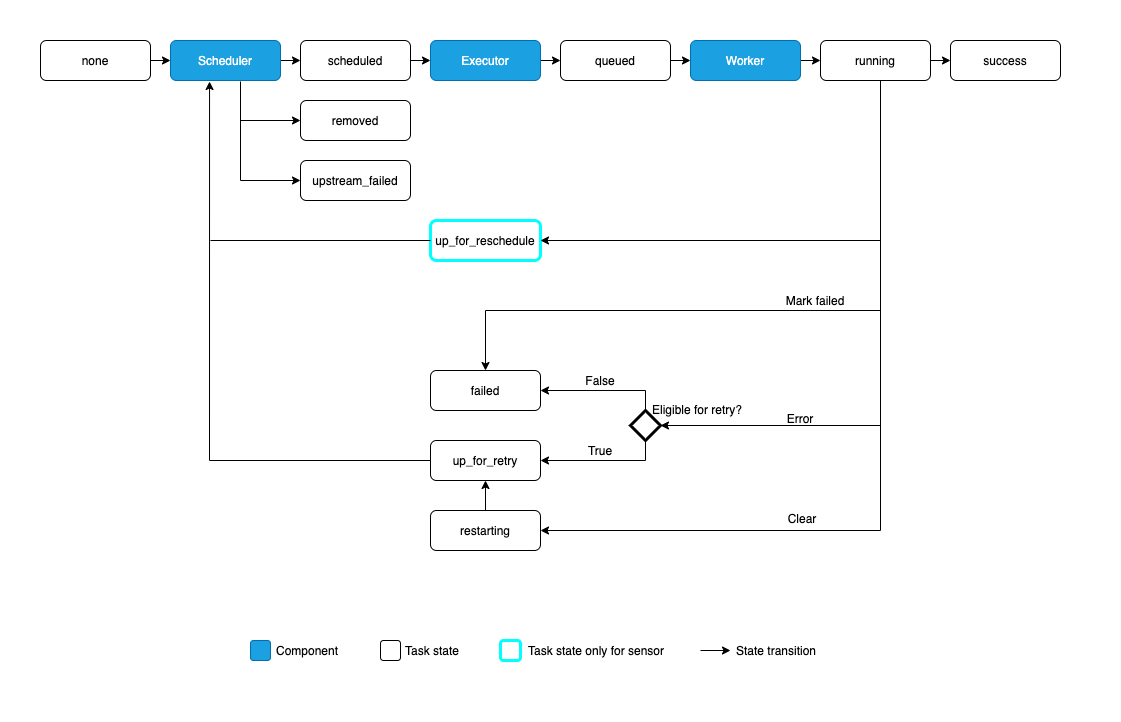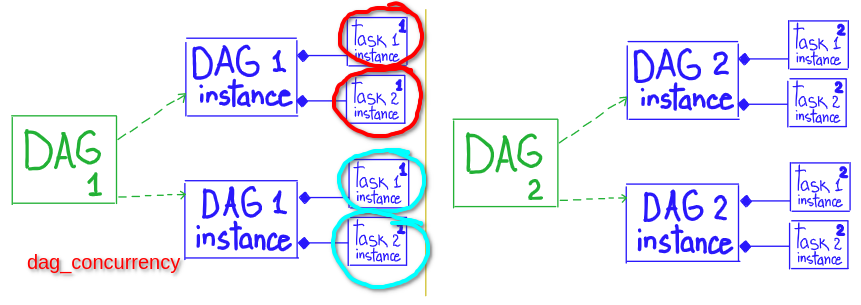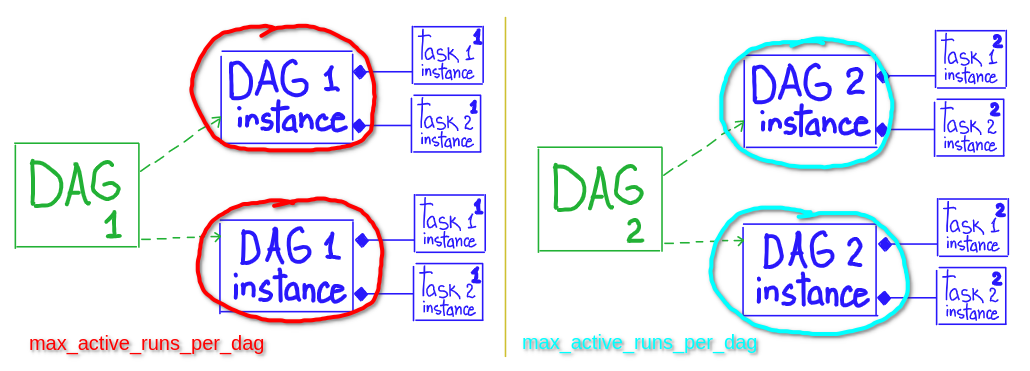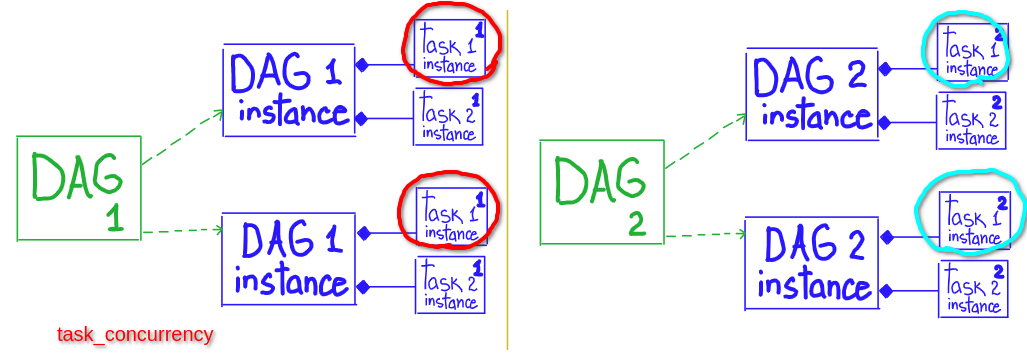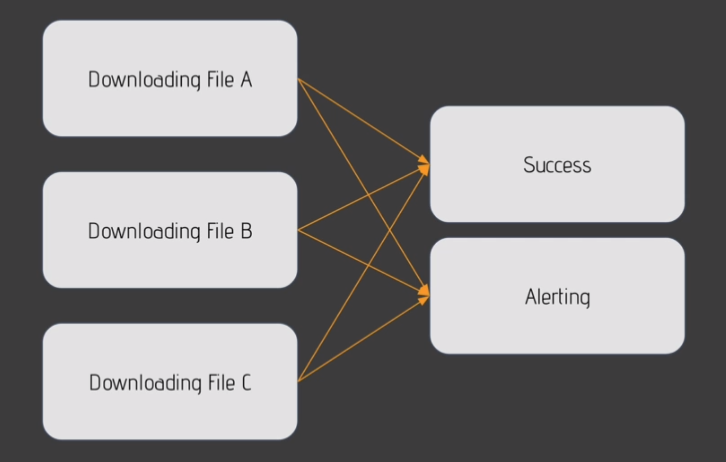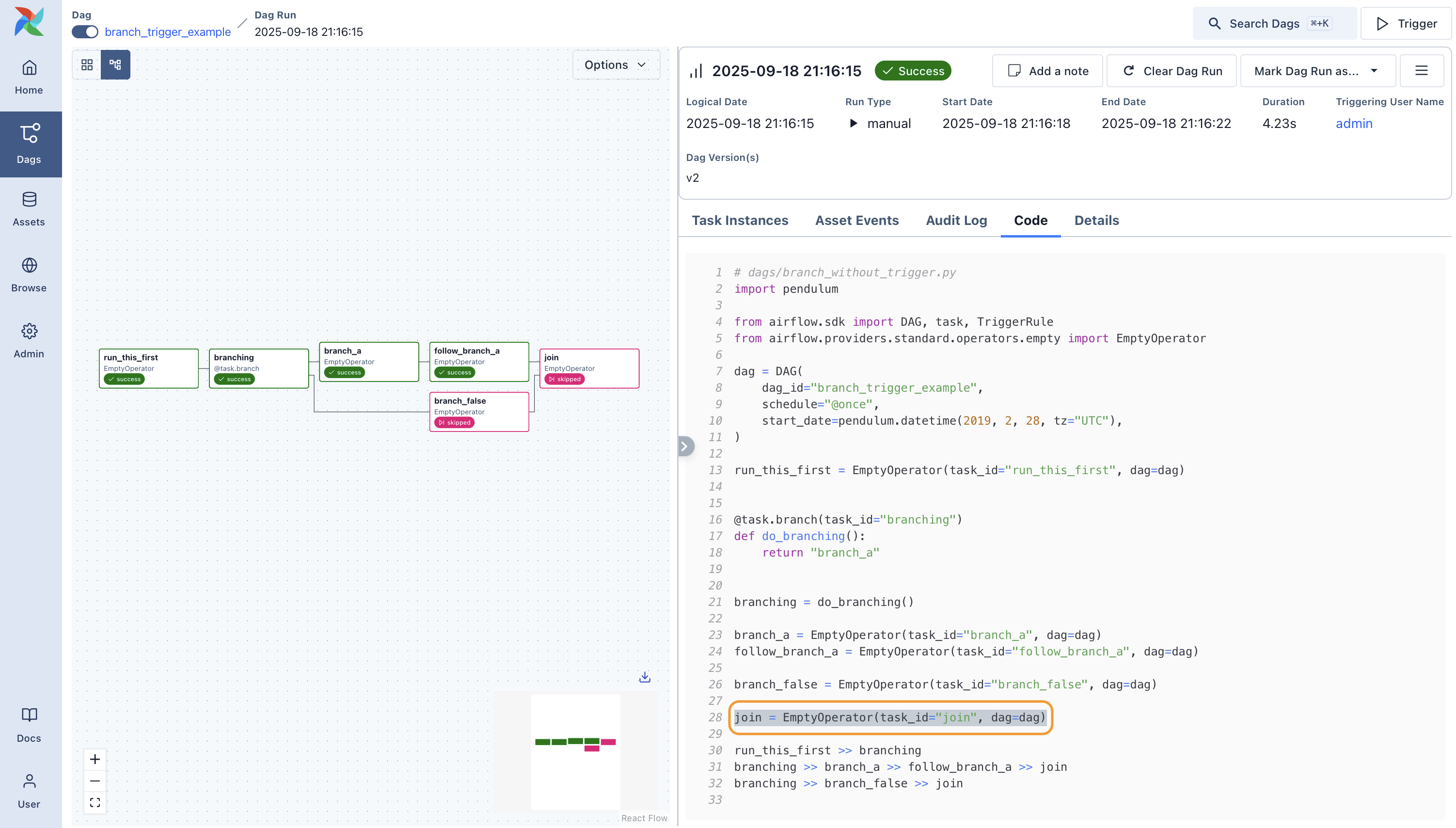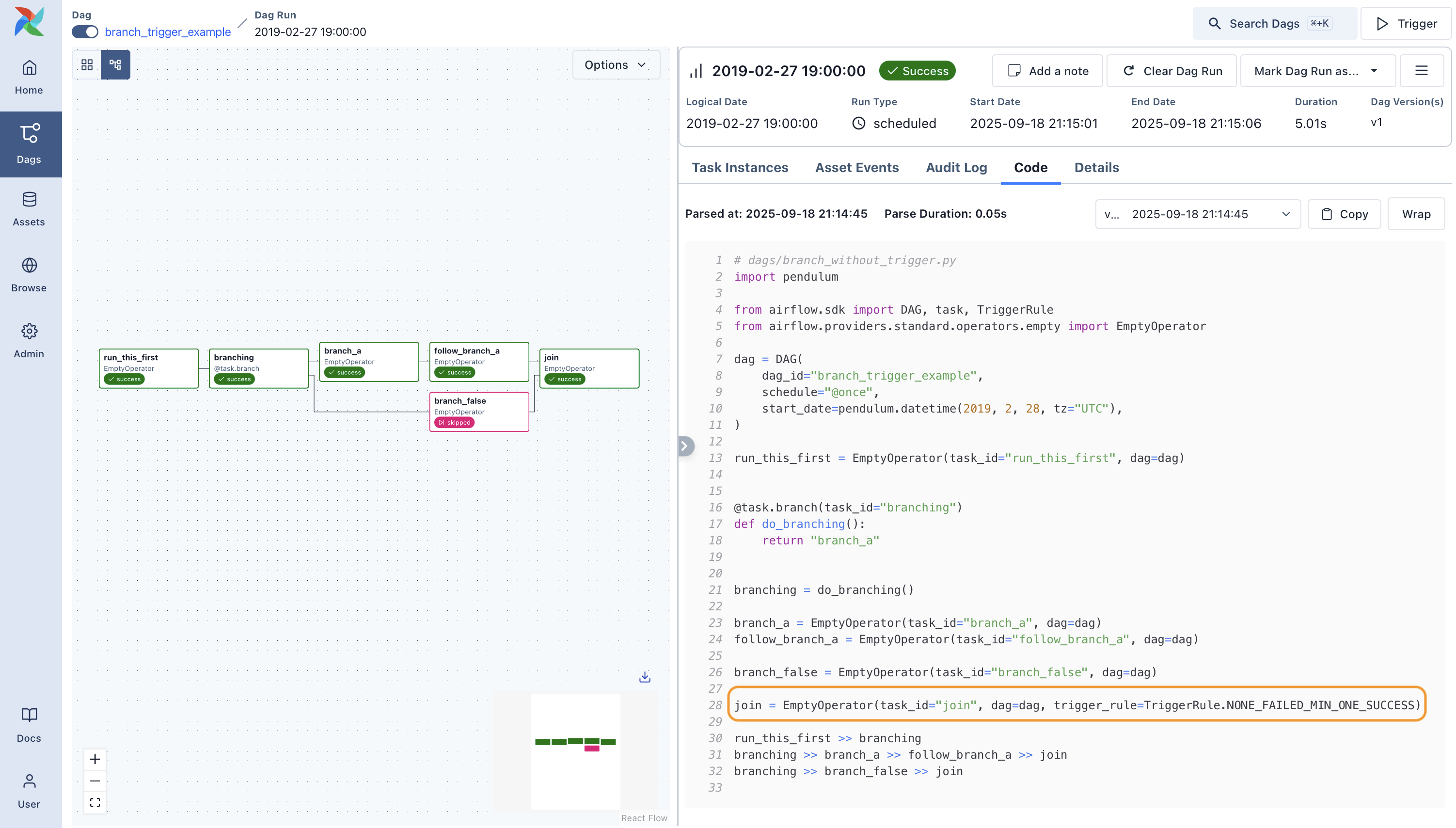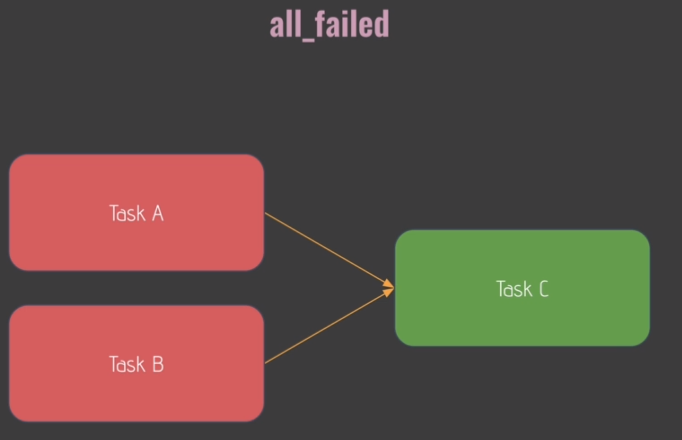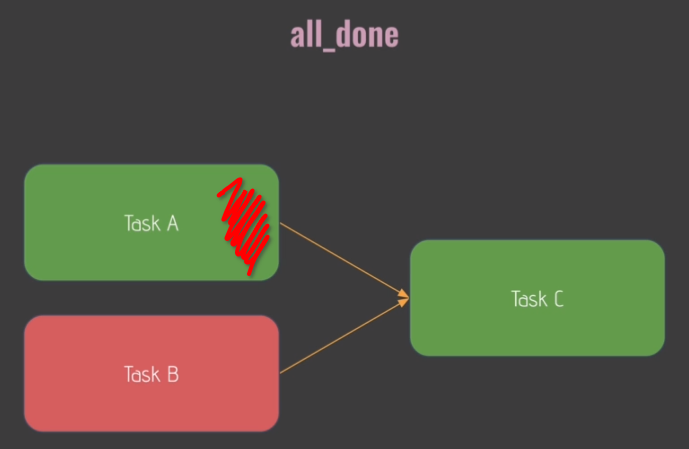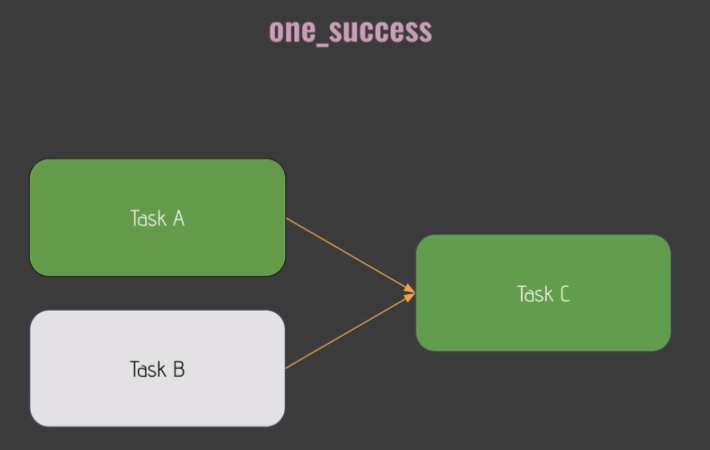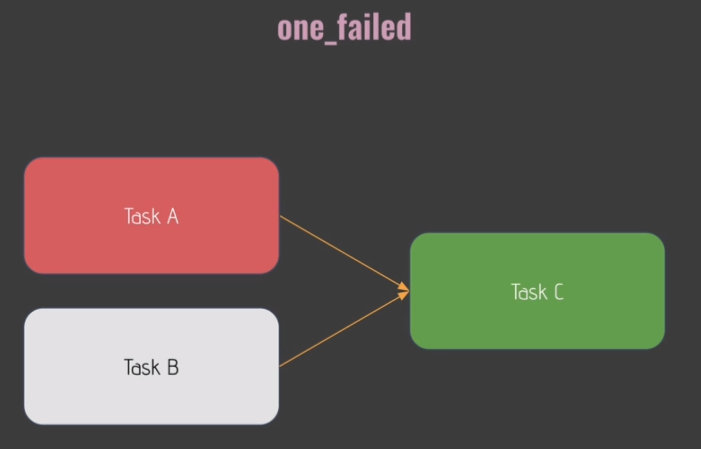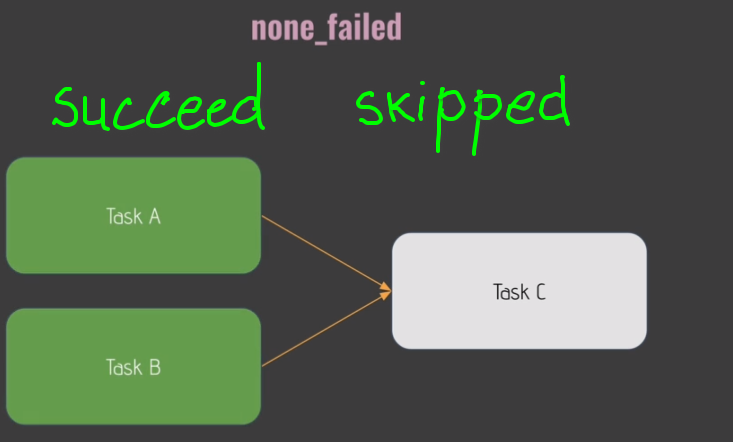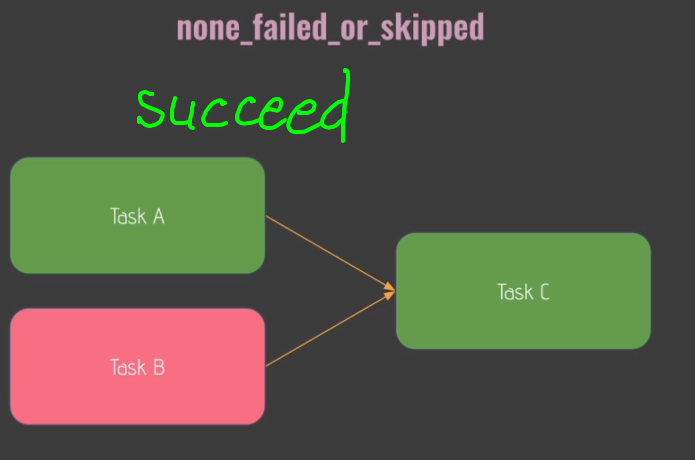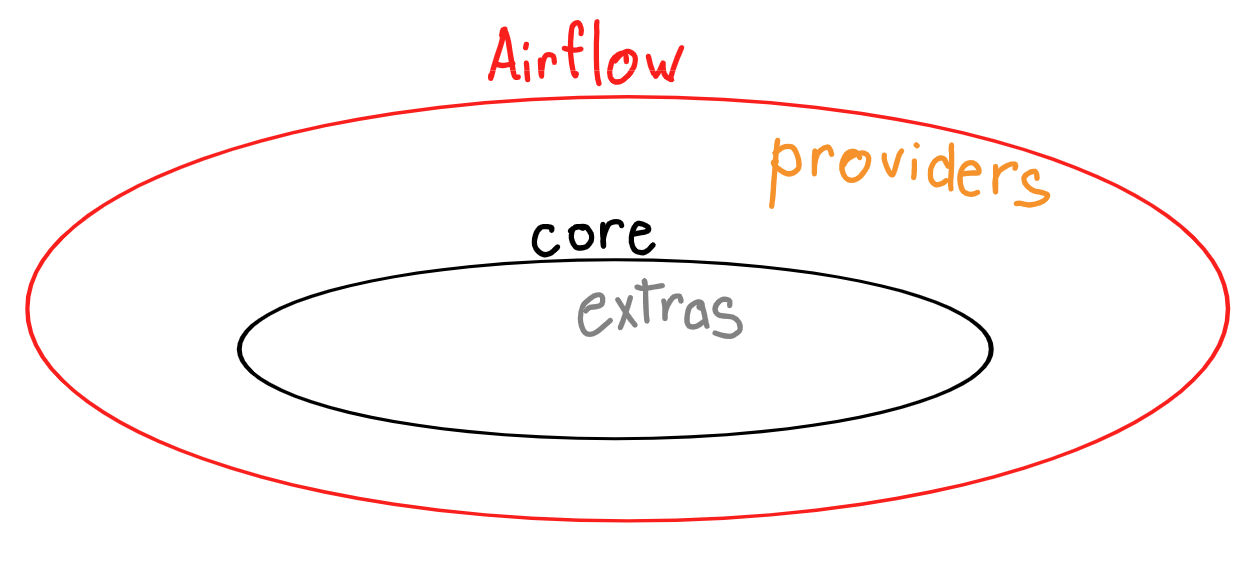- flyte
- for ML pipelines
- python centric
- good CLI
- flyte cheat sheet
- flyte github
- luidgi
- mage-ai
- apache nifi
- aws step functions
- perfect
- dagster
- ML:kedro
- BigData:oozie
official documentation of key concepts
- DAG
a graph object representing your data pipeline ( collection of tasks ).
Should be:- idempotent ( execution of many times without side effect )
- can be retried automatically
- toggle should be "turned on" on UI for execution
- Operator describe a single task in your data pipeline
- action - perform actions ( airflow.operators.BashOperator, airflow.operators.PythonOperator, airflow.operators.EmailOperator... )
- transfer - move data from one system to another ( SftpOperator, S3FileTransformOperator, MySqlOperator, SqliteOperator, PostgresOperator, MsSqlOperator, OracleOperator, JdbcOperator, airflow.operators.HiveOperator.... ) ( don't use it for BigData - source->executor machine->destination )
- sensor - waiting for arriving data to predefined location ( airflow.contrib.sensors.file_sensor.FileSensor ) has a method #poke that is calling repeatedly until it returns True
- Task An instance of an operator
- Task Instance Represents a specific run of a task = DAG + Task + Point of time
- Workflow Combination of Dags, Operators, Tasks, TaskInstances
AIRFLOW_CONFIG - path to apache.cfg environment variables
-
executor/airflow.cfg
- remove examples from UI (restart) load_examples = False
- how much time a new DAGs should be picked up from the filesystem, ( dag update python file update ) min_file_process_interval = 0 dag_dir_list_interval = 60
- authentication ( important for REST api 1.x.x )
- auth_backend = airflow.api.auth.backend.basic_auth
AIRFLOW__API__AUTH_BACKEND=airflow.api.auth.backend.basic_auth # for version 2.0.+ - auth_backend = airflow.api.auth.backend.default
- auth_backend = airflow.api.auth.backend.basic_auth
-
from airflow.models import Variable my_var = Variable.set("my_key", "my_value")
-
connections as variables
from airflow.hooks.base_hook import BaseHook my_connection = BaseHook.get_connection("name_of_connection") login = my_connection.login pass = my_connection.password
-
templating
{{ var.value.<variable_key> }}
Remember, don’t put any get/set of variables outside of tasks.

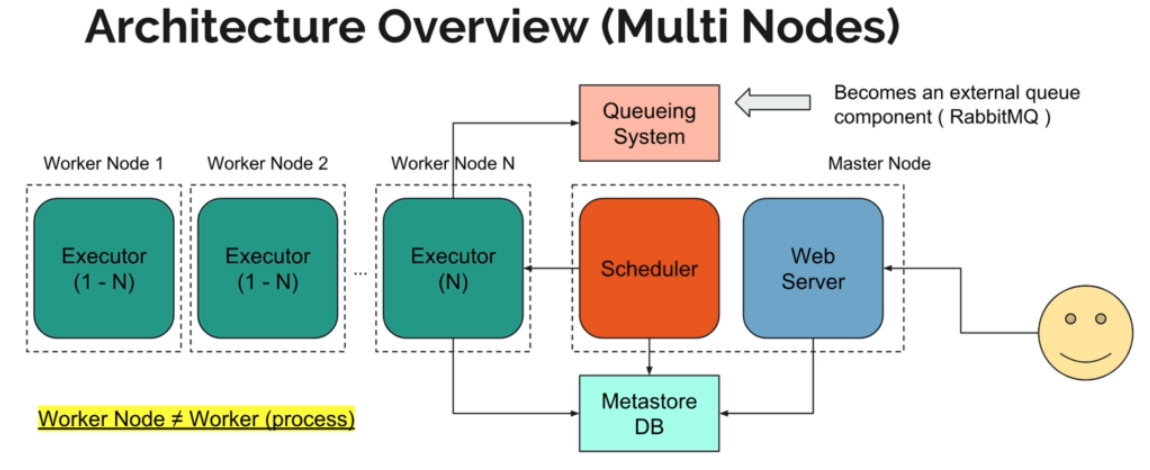
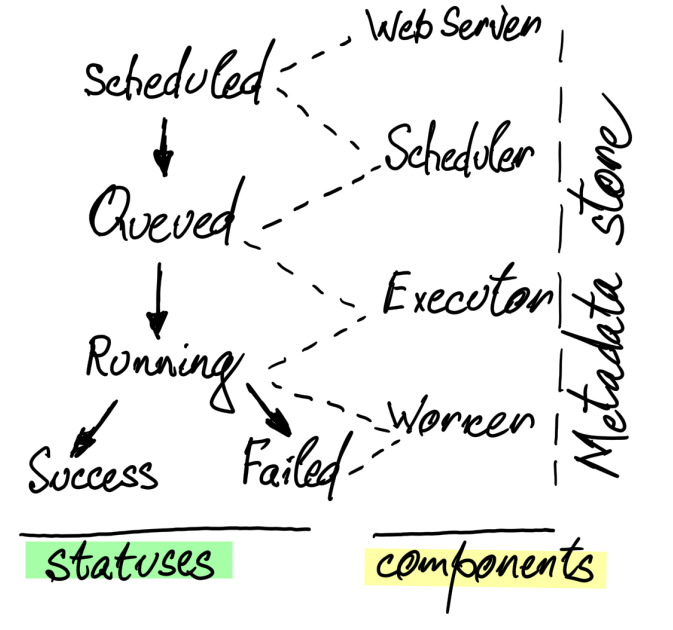
from scheduled: https://github.com/apache/airflow/blob/866a601b76e219b3c043e1dbbc8fb22300866351/airflow/jobs/scheduler_job.py#L329
to queued:https://github.com/apache/airflow/blob/866a601b76e219b3c043e1dbbc8fb22300866351/airflow/jobs/scheduler_job.py#L483
- WebServer
- read user request
- UI
- Scheduler
- scan folder "%AIRFLOW%/dags" ( config:dag_folder ) and with timeout ( config:dag_dir_list_interval )
- monitor execution "start_date" ( + "schedule_interval", first run with start_date ), write "execution_date" ( last time executed )
- create DagRun ( instance of DAG ) and fill DagBag ( with interval config:worker_refresh_interval )
- start_date ( start_date must be in past, start_date+schedule_interval must be in future )
- end_date
- retries
- retry_delay
- schedule_interval (cron:str / datetime.timedelta) ( cron presets: @once, @hourly, @daily, @weekly, @monthly, @yearly )
- catchup ( config:catchup_by_default ) or "BackFill" ( fill previous executions from start_date ) actual for scheduler only ( backfill is possible via command line )
airflow dags backfill -s 2021-04-01 -e 2021-04-05 --reset_dagruns my_dag_name
- print snapshot of task state tracked by executor
pkill -f -USR2 "airflow scheduler"
- Executor ( How task will be executed, how it will be queued )
- type: LocalExecutor(multiple task in parallel), SequentialExecutor, CeleryExecutor, DaskExecutor
- Worker ( Where task will be executed )
- Metadatabase ( task status )
- types
- configuration:
- sql_alchemy_conn
- sql_alchemy_pool_enabled
# create python virtual env
python3 -m venv airflow-env
source airflow-env/bin/activate
# create folder
mkdir airflow
export AIRFLOW_HOME=`pwd`/airflow
# install workflow
AIRFLOW_VERSION=2.0.2
PYTHON_VERSION=3.8
pip install apache-airflow==$AIRFLOW_VERSION \
--constraint "https://raw.githubusercontent.com/apache/airflow/constraints-$AIRFLOW_VERSION/constraints-$PYTHON_VERSION.txt"
# necessary !!!
exit airflowdags_folder = /home/ubuntu/airflow/dags
sql_alchemy_conn = postgresql+psycopg2://airflow:airflow@airflow-db.cpw.us-east-1.rds.amazonaws.com:5432/airflow
load_examples=False
dag_dir_list_interval = 30
catchup_by_default = False
auth_backend = airflow.api.auth.backend.basic_auth
expose_config = True
dag_run_conf_overrides_params=True
# hide all Rendered Templates
show_templated_fields=none
[webserver]
instance_name = "title name of web ui"
Airflow start on python nacked start start components start separate components start locally manual start
# installed package
/home/ubuntu/.local/lib/python3.8/site-packages
# full path to airflow
/home/ubuntu/.local/bin/airflow
# init workflow
airflow initdb
# create user first login
airflow users create --role Admin --username vitalii --email vcherkashyn@gmail.com --firstname Vitalii --lastname Cherkashyn --password my_secure_password
# airflow resetdb - for reseting all data
airflow scheduler &
airflow webserver -p 8080 &
echo "localhost:8080"
# check logs
airflow serve_logs
# sudo apt install sqllite3
# sqllite3 $AIRFLOW_HOME/airflow.dbexport AIRFLOW_HOME=/home/ubuntu/airflow
export PATH=$PATH:/home/ubuntu/.local/bin
export AIRFLOW__WEBSERVER__INSTANCE_NAME="test-account-01"
nohup airflow webserver -p 8080 --pid $AIRFLOW_HOME/airflow-webserver.pid > $AIRFLOW_HOME/airflow-webserver.log 2>&1 &
nohup airflow scheduler --pid $AIRFLOW_HOME/airflow-scheduler.pid > $AIRFLOW_HOME/airflow-scheduler.log 2>&1 &
nohup airflow celery flower -p 8081 > $AIRFLOW_HOME/airflow-celery-flower.log 2>&1 &ps aux | grep airflow | grep webserver | awk '{print $14}' | grep webserver
ps aux | grep airflow | grep scheduler | awk '{print $15}'
ps aux | grep airflow | grep flower | awk '{print $14}'ps aux | grep airflow | grep webserver | awk '{print $2}' | xargs -I{} kill -15 {} || echo "webserver removed"
rm $AIRFLOW_HOME/airflow-webserver.pid || echo "not exists"
ps aux | grep airflow | grep scheduler | awk '{print $2}' | xargs -I{} kill -15 {} || echo "scheduler removed"
rm $AIRFLOW_HOME/airflow-scheduler.pid || echo "not exists"
ps aux | grep airflow | grep flower | awk '{print $2}' | xargs -I{} kill -15 {} || echo "flower removed"# remove dags
rm -rf /home/ubuntu/airflow/dags/*
# remove logs
rm -rf /home/ubuntu/airflow/logs/dag_processor_manager/*
rm -rf /home/ubuntu/airflow/logs/scheduler/*
rm -rf /home/ubuntu/airflow/logs/shopify_collections_create/*
rm -rf /home/ubuntu/airflow/logs/shopify_image_add_product/*
rm -rf /home/ubuntu/airflow/logs/shopify_image_set_variant/*
rm -rf /home/ubuntu/airflow/logs/shopify_product_create/*
rm -rf /home/ubuntu/airflow/logs/shopify_product_delete/*
rm -rf /home/ubuntu/airflow/logs/shopify_product_update/*
# clean up DB !!!
airflow db reset
# !!! all variables after reset should be created again manually astro dev init
astro dev start
astro dev ps
astro dev stop# * copy your dags to ``` .dags```
docker-compose -f docker-compose-LocalExecutor.yml up -dpython env create -f environment.yml
source activate airflow-tutorialcredentials
ssh -p 2200 airflow@localhost
# passw: airflowactivate workspace
source .sandbox/bin/activate- backup DB
- check you DAG for deprecations
- upgrade airflow
pip install "apache-airflow==2.0.1" --constraint constraint-file - upgrade DB
airflow db upgrade
- restart all
check workspace
airflow --help- action
- transfer ( data )
- sensor ( waiting for some event )
- long running task
- BaseSensorOperator
- poke method is responsible for waiting
!!! create env variables for securing connection
Admin -> Connections -> postgres_default
# adjust login, password
Data Profiling->Ad Hoc Query-> postgres_default
select * from dag_run;via PostgreConnection
clear_xcom = PostgresOperator(
task_id='clear_xcom',
provide_context=True,
postgres_conn_id='airflow-postgres',
trigger_rule="all_done",
sql="delete from xcom where dag_id LIKE 'my_dag%'",
dag=dag)
configuration must have "api.auth_backend", for example:
[api]
auth_backend = airflow.api.auth.backend.default AIRFLOW_URL=https://airflow.local
DAG_NAME=xsd_generation
AIRFLOW_ENDPOINT=$AIRFLOW_URL/api/experimental/dags/$DAG_NAME/dag_runs
curl -X GET -u $USER_AIRFLOW:$PASSWORD_AIRFLOW $AIRFLOW_ENDPOINTimport urllib2
import json
AIRFLOW_URL="https://airflow.local/api/experimental/dags/name_of_my_dag/dag_runs"
payload_dict = {"conf": {"dag_param_1": "test value"}}
req = urllib2.Request(AIRFLOW_URL, data=json.dumps(payload_dict))
req.add_header('Content-Type', 'application/json')
req.add_header('Cache-Control', 'no-cache')
req.get_method = lambda: "POST"
f = urllib2.urlopen(req)
print(f.read())ENDPOINT="$AIRFLOW_URL/api/v1/dags/notification_send/dagRuns"
BODY='{"conf":{"account_id":"xxx","message_type":"error","message_text":"test_curl"}}'
curl --header "Content-Type: application/json" --data-binary $BODY -u $AIRFLOW_USER:$AIRFLOW_PASSWORD -X POST $ENDPOINTAIRFLOW_ENDPOINT="https://airflow.local/api/experimental"
AIRFLOW_USER=my_user
AIRFLOW_PASSWORD=my_passwAirflow REST API request
function airflow-event-delete(){
if [ -z "$1" ]
then
echo "first argument should have filename"
exit 1
fi
DAG_NAME="shopify_product_delete"
DAG_RUN_ID="manual_shopify_product_delete_"`date +%Y-%m-%d-%H:%M:%S:%s`
ENDPOINT="$AIRFLOW_URL/api/v1/dags/$DAG_NAME/dagRuns"
BODY="{\"conf\":{\"account_id\":\"$ACCOUNT_ID\",\"filename\":\"$1\"},\"dag_run_id\":\"$DAG_RUN_ID\"}"
echo $BODY
curl -H "Content-Type: application/json" --data-binary $BODY -u $AIRFLOW_USER:$AIRFLOW_PASSWORD -X POST $ENDPOINT
}airflow dag code
class ListComparatorRequest:
def __init__(self, dag_run_config: Dict):
self.account_id: str = dag_run_config["account_id"]
self.filename: str = dag_run_config["filename"]
def request_object(self) -> Dict:
return {
"account_id": self.account_id,
"filename": self.filename,
}
def __str__(self) -> str:
return f"account_id:{self.account_id} filename:{self.filename}"
request: ListComparatorRequest = ListComparatorRequest(context["dag_run"].conf)curl -u $AIRFLOW_USER:$AIRFLOW_PASSWORD -X GET "$ENDPOINT/test"AIRFLOW_URL="https://airflow.vantage.com"
# target task list url
AIRFLOW_TASK_LIST="$AIRFLOW_URL/taskinstance/list/?_flt_0_task_id=my_task&_flt_0_state=failed&_oc_TaskInstanceModelView=execution_date&_od_TaskInstanceModelView=desc"
AIRFLOW_HEADER='Cookie: iamlbcookie=01; AMProd=*AAJTSQACM...'curl "$AIRFLOW_TASK_LIST" -H "$AIRFLOW_HEADER" > out.html
# change /log?-> /get_logs_with_metadata?
# add to the end: &try_number=1&metadata=null
for each_log_url in `cat out.html | hq '//table/tr/td[17]/a/@href' | awk -F 'href=' '{print $2}' | sed 's/\/log\?/\/get_logs_with_metadata/g' | sed -r 's/[\"\,]+//g' | awk '{print $1"&try_number=1&metadata=null"}'`; do
file_name=`echo $each_log_url | awk -F '[=&]' '{print $2}'`
curl $each_log_url -H "$AIRFLOW_HEADER" > $file_name
donehttps://airflow.apache.org/docs/apache-airflow/stable/usage-cli.html
# activation
register-python-argcomplete airflow >> ~/.bashrc# dag list
airflow list_dags
airflow list_tasks dag_id
airflow trigger_dag my-dag
# triggering
# https://airflow.apache.org/docs/apache-airflow/1.10.2/cli.html
airflow trigger_dag -c "" dag_iddoc run in case of removing dag (delete dag) - all metadata will me removed from database
# !!! no spaces in request body !!!
REQUEST_BODY='{"conf":{"session_id":"bff2-08275862a9b0"}}'
# ec2-5-221-68-13.compute-1.amazonaws.com:8080/api/v1/dags/test_dag/dagRuns
curl --data-binary $REQUEST_BODY -H "Content-Type: application/json" -u $AIRFLOW_USER:$AIRFLOW_PASSWORD -X POST $AIRFLOW_URL"/api/v1/dags/$DAG_ID/dagRuns"# run dag from command line
REQUEST_BODY='{"conf":{"sku":"bff2-08275862a9b0","pool_for_execution":"test_pool2"}}'
DAG_ID="test_dag2"
airflow dags trigger -c $REQUEST_BODY $DAG_IDSTART_TIME=2023-02-07T09:03:16.827376+00:00
END_TIME=2023-02-07T09:06:38.279548+00:00
airflow clear $DAG_NAME -t $TASK_NAME -s $START_TIME -e $END_TIMEcurl -X GET -u $AIRFLOW_USER:$AIRFLOW_PASSWORD "$AIRFLOW_ENDPOINT/dags/$DAG_ID/dagRuns" | jq '.[] | if .state=="running" then . else empty end'
curl -u $AIRFLOW_USER:$AIRFLOW_PASSWORD -X GET $AIRFLOW_ENDPOINT"/dags/$DAG_ID/dag_runs/$DATE_DAG_EXEC/tasks/$TASK_ID"curl -u $AIRFLOW_USER:$AIRFLOW_PASSWORD -X GET "$AIRFLOW_ENDPOINT/task?dag_id=$DAG_ID&task_id=$TASK_ID&execution_date=$DATE_DAG_EXEC"BODY='{"dag_ids":["shopify_product_create"],"page_limit":30000}'
curl -X POST "$AIRFLOW_URL/api/v1/dags/~/dagRuns/list" -H "Content-Type: application/json" --data-binary $BODY --user "$AIRFLOW_USER:$AIRFLOW_PASSWORD" > dag-runs.json
curl -X GET "$AIRFLOW_URL/api/v1/dags/shopify_product_create/dagRuns" -H "Content-Type: application/json" --data-binary $BODY --user "$AIRFLOW_USER:$AIRFLOW_PASSWORD"
DAG_NAME=shopify_product_create
curl -X GET -u $AIRFLOW_USER:$AIRFLOW_PASSWORD "$AIRFLOW_ENDPOINT/dags/$DAG_NAME/dag_runs"BODY='{"dag_ids":["shopify_product_create"]}'
curl -X POST "$AIRFLOW_URL/api/v1/dags/~/dagRuns/list" -H "Content-Type: application/json" --data-binary $BODY --user "$AIRFLOW_USER:$AIRFLOW_PASSWORD"
DAG_ID=shopify_product_create
TASK_ID=product_create
DAG_RUN_ID=shopify_product_create_2021-06-15T18:59:35.1623783575Z_6062835
alias get_airflow_log='curl -X GET --user "$AIRFLOW_USER:$AIRFLOW_PASSWORD" $AIRFLOW_URL/api/v1/dags/$DAG_ID/dagRuns/$DAG_RUN_ID/taskInstances/$TASK_ID/logs/1'BODY='{"dag_ids":["shopify_product_create"],"state":["failed"]}'
curl -X POST "$AIRFLOW_URL/api/v1/dags/~/dagRuns/~/taskInstances/list" -H "Content-Type: application/json" --data-binary $BODY --user "$AIRFLOW_USER:$AIRFLOW_PASSWORD" BODY="{\"key\":\"AWS_ACCESS_KEY_ID\",\"value\":\"${AWS_ACCESS_KEY_ID}\"}"
curl --data-binary $BODY -H "Content-Type: application/json" --user "$AIRFLOW_USER:$AIRFLOW_PASSWORD" -X POST $CREATE_VAR_ENDPOINTcurl -X POST "$AIRFLOW_URL/api/v1/pools" -H "Content-Type: application/json" --data '{"name":"product","slots":18}' --user "$AIRFLOW_USER:$AIRFLOW_PASSWORD"example of overwriting configuration from config file by env-variables
[core]
airflow_home='/path/to/airflow'
dags_folder='/path/to/dags'AIRFLOW__CORE__DAGS_FOLDER='/path/to/new-dags-folder'
AIRFLOW__CORE__AIRFLOW_HOME='/path/to/new-version-of-airflow'# * maximum number of tasks running across an entire Airflow installation
# * number of physical python processes the scheduler can run, task (processes) that running in parallel
# scope: Airflow
core.parallelism
# * max number of tasks that can be running per DAG (across multiple DAG runs)
# * number of tast instances that are running simultaneously per DagRun ( amount of TaskInstances inside one DagRun )
# scope: DAG.task
core.dag_concurrency
# * maximum number of active DAG runs, per DAG
# * number of DagRuns - will be concurrency in dag execution, don't use in case of dependencies of dag-runs
# scope: DAG.instance
core.max_active_runs_per_dag
# Only allow one run of this DAG to be running at any given time, default value = core.max_active_runs_per_dag
dag = DAG('my_dag_id', max_active_runs=1)# Allow a maximum of 10 tasks to be running across a max of 2 active DAG runs
dag = DAG('example2', concurrency=10, max_active_runs=2)
# !!! pool: the pool to execute the task in. Pools can be used to limit parallelism for only a subset of tasks
core.non_pooled_task_slot_count: number of task slots allocated to tasks not running in a pool
scheduler.max_threads: how many threads the scheduler process should use to use to schedule DAGs
celery.worker_concurrency: max number of task instances that a worker will process at a time if using CeleryExecutor
celery.sync_parallelism: number of processes CeleryExecutor should use to sync task state
executor = LocalExecutor
sql_alchemy_conn = postgresql+psycopg2://airflow@localhost:5432/airflow_metadatasettings
executor = CeleryExecutor
sql_alchemy_conn = postgresql+psycopg2://airflow@localhost:5432/airflow_metadata
# RabbitMQ UI: localhost:15672
broker_url = pyamqp://admin:rabbitmq@localhost/
result_backend = db+postgresql://airflow@localhost:5432/airflow_metadata
worker_log_server_port = 8899start Celery worker node
# just a start worker process
airflow worker
# start with two child worker process - the same as 'worker_concurrency" in airflow.cfg
airflow worker -c 2
# default pool name: default_pool, default queue name: default
airflow celery worker --queues defaultnormal celery worker output log
[2021-07-11 08:23:46,260: INFO/MainProcess] Connected to amqp://dskcfg:**@toad.rmq.cloudamqp.com:5672/dskcf
[2021-07-11 08:23:46,272: INFO/MainProcess] mingle: searching for neighbors
[2021-07-11 08:23:47,304: INFO/MainProcess] mingle: sync with 1 nodes
[2021-07-11 08:23:47,305: INFO/MainProcess] mingle: sync complete
[2021-07-11 08:23:47,344: INFO/MainProcess] celery@airflow-01-worker-01 ready.
** in case of adding/removing Celery Workers - restart Airflow Flower **
# Task1 -> Task2 -> Task3
t1.set_downstream(t2);t2.set_downstream(t3)
t1 >> t2 >> t3
t3.set_upstream(t2);t2.set_upstream(t1)
t3 << t2 << t1
from airflow.models.baseoperator import chain, cross_downstream
chain(t1,t2,t3)
cross_downstream([t1,t2], [t3,t4])
# or set multiply dependency
upstream_tasks = t3.upstream_list
upstream_tasks.append(t2)
upstream_tasks.append(tt1)
upstream_tasks >> t3def python_operator_core_func(**context):
print(context['task_instance'])
context["dag_run"].conf['dag_run_argument']
# the same as previous
# manipulate with task-instance inside custom function, context inside custom function
// context['ti'].xcom_push(key="k1", value="v1")
context.get("ti").xcom_push(key="k1", value="v1")
// and after that pull it and read first value
// context.get("ti").xcom_pull(task_ids="name_of_task_with_push")[0]
// context.get("ti").xcom_pull(task_ids=["name_of_task_with_push", "name_another_task_to_push"])[0]
return "value for saving in xcom" # key - return_value
...
PythonOperator(task_id="python_example", python_callable=python_operator_core_func, provide_context=True, do_xcom_push=True )magic numbers for jinja template
def out_of_context_function():
return_value = ("{{ ti.xcom_pull(task_ids='name_of_task_with_push')[0] }}")
from datetime import datetime
from airflow import DAG
from airflow.operators.python_operator import PythonOperator
from airflow.utils.timezone import make_aware
from airflow.models import XCom
def pull_xcom_call(**kwargs):
# if you need only TaskInstance: pull_xcom_call(ti)
# !!! hard-coded value
execution_date = make_aware(datetime(2020, 7, 24, 23, 45, 17, 00))
xcom_values = XCom.get_many(dag_ids=["data_pipeline"], include_prior_dates=True, execution_date=execution_date)
print('XCom.get_many >>>', xcom_values)
get_xcom_with_ti = kwargs['ti'].xcom_pull(dag_id="data_pipeline", include_prior_dates=True)
print('ti.xcom_pull with include_prior_dates >>>', get_xcom_with_ti)
xcom_pull_task = PythonOperator(
task_id='xcom_pull_task',
dag=dag, # here need to set DAG
python_callable=pull_xcom_call,
provide_context=True
)from airflow.operators.subdag_operator import SubDagOperator
...
subdag_task = SubDagOperator(subdag=DAG(SUBDAG_PARENT_NAME+"."+SUBDAG_NAME,schedule_interval=parent_dag.schedule_interval, start_date=parent_dag.start_date,catchup=False))
...airflow tasks test my_dag_name my_task_name 2021-04-01
collaboration with external sources via "connections"
Hooks act as an interface to communicate with the external shared resources in a DAG.
GUI: Admin -> Xcoms
Should be manually cleaned up
Exchange information between multiply tasks - "cross communication".
Object must be serializable
Some operators ( BashOperator, SimpleHttpOperator, ... ) have parameter xcom_push=True - last std.output/http.response will be pushed
Some operators (PythonOperator) has ability to "return" value from function ( defined in operator ) - will be automatically pushed to XCOM
Saved in Metadabase, also additional data: "execution_date", "task_id", "dag_id"
"execution_date" means hide(skip) everything( same task_id, dag_id... ) before this date
xcom_push(key="name_of_value", value="some value")
xcom_pull(task_ids="name_of_task_with_push")task state
if ti.state not in ["success", "failed", "running"]:
return None!!! don't use "depends_on_past"
def check_for_activated_source():
# return name ( str ) of the task
return "mysql_task"
branch_task = BranchPythonOperator(task_id='branch_task', python_callable=check_for_activated_source)
mysql_task = BashOperator(task_id='mysql_task', bash_command='echo "MYSQL is activated"')
postgresql_task = BashOperator(task_id='postgresql_task', bash_command='echo "PostgreSQL is activated"')
mongo_task = BashOperator(task_id='mongo_task', bash_command='echo "Mongo is activated"')
branch_task >> mysql_task
branch_task >> postgresql_task
branch_task >> mongo_task
# branch_task >> [mongo_task, mysql_task, postgresql_task]from airflow.operators.python_operator import PythonOperator
from airflow.models.skipmixin import SkipMixin
def fork_label_determinator(**context):
decision = context['dag_run'].conf.get('branch', 'default')
return "run_task_1"
all_tasks = set([task1, task2, task3])
class SelectOperator(PythonOperator, SkipMixin):
def execute(self, context):
condition = super().execute(context)
self.log.info(">>> Condition %s", condition)
if condition=="run_task_1":
self.skip(context['dag_run'], context['ti'].execution_date, list(all_tasks-set([task1,])) )
return
# not working properly - applied workaround
# fork_label = BranchPythonOperator(
fork_label = SelectOperator(
task_id=FORK_LABEL_TASK_ID,
provide_context=True,
python_callable=fork_label_determinator,
dag=dag_subdag
)
Task States:
run_this_first >> branching
branching >> branch_a >> follow_branch_a >> join
branching >> branch_false >> joinjoin = DummyOperator(task_id='join', dag=dag, trigger_rule='none_failed_or_skipped')
Trigger Rules:
GUI: Browse->SLA Misses
def log_sla_miss(dag, task_list, blocking_task_list, slas, blocking_tis):
print("SLA was missed on DAG {0}s by task id {1}s with task list: {2} which are " \
"blocking task id {3}s with task list: {4}".format(dag.dag_id, slas, task_list, blocking_tis, blocking_task_list))
...
# call back function for missed SLA
with DAG('sla_dag', default_args=default_args, sla_miss_callback=log_sla_miss, schedule_interval="*/1 * * * *", catchup=False) as dag:
t0 = DummyOperator(task_id='t0')
t1 = BashOperator(task_id='t1', bash_command='sleep 15', sla=timedelta(seconds=5), retries=0)
t0 >> t1should be placed into "dag" folder ( default: %AIRFLOW%/dag )
- minimal dag
from airflow import DAG
from datetime import datetime, timedelta
with DAG('airflow_tutorial_v01',
start_date=datetime(2015, 12, 1),
catchup=False
) as dag:
print(dag)
# next string will not work !!! only for Task/Operators values !!!!
print("{{ dag_run.conf.get('sku', 'default_value_for_sku') }}" )from airflow import DAG
from datetime import datetime, timedelta
from airflow.operators.python import PythonOperator
from airflow.utils.dates import days_ago
def print_echo(**context):
print(context)
# next string will not work !!! only for Task/Operators values !!!!
print("{{ dag_run.conf.get('sku', 'default_value_for_sku') }}" )
with DAG('test_dag',
start_date=days_ago(100),
catchup=False,
schedule_interval=None,
) as dag:
PythonOperator(task_id="print_echo",
python_callable=print_echo,
provide_context=True,
retries=3,
retry_delay=timedelta(seconds=30),
priority_weight=4,
weight_rule=WeightRule.ABSOLUTE, # mandatory for exected priority behavior
# dag_run.conf is not working for pool !!!
pool="{{ dag_run.conf.get('pool_for_execution', 'default_pool') }}",
# retries=3,
# retry_delay=timedelta(seconds=30),
doc_md="this is doc for task")# still not working !!!! impossible to select pool via parameters
from airflow import DAG
from airflow.operators.bash_operator import BashOperator
from airflow.utils.dates import days_ago
dag = DAG("test_dag2", schedule_interval=None, start_date=days_ago(2))
dag_pool="{{ dag_run.conf['pool_for_execution'] }}"
print(dag_pool)
parameterized_task = BashOperator(
task_id='parameterized_task',
queue='collections',
pool=f"{dag_pool}",
bash_command=f"echo {dag_pool}",
dag=dag,
)
print(f">>> {parameterized_task}") DEFAULT_ARGS = {
'owner': 'airflow',
'depends_on_past': True,
'start_date': datetime(2015, 12, 1),
'email_on_failure': False,
'email_on_retry': False,
# 'retries': 3,
# 'retry_delay': timedelta(seconds=30),
}
with DAG(DAG_NAME,
start_date=datetime(2015, 12, 1),
catchup=False,
catchup=True,
schedule_interval=None,
max_active_runs=1,
concurrency=1,
default_args=DEFAULT_ARGS
) as dag:
PythonOperator(task_id="image_set_variant",
python_callable=image_set_variant,
provide_context=True,
retries=3,
retry_delay=timedelta(seconds=30),
# retries=3,
# retry_delay=timedelta(seconds=30),
# https://github.com/apache/airflow/blob/866a601b76e219b3c043e1dbbc8fb22300866351/airflow/jobs/scheduler_job.py#L392
# priority_weight=1 default is 1, more high will be executed earlier
doc_md="this is doc for task")# task concurrency
t1 = BaseOperator(pool='my_custom_pool', task_concurrency=12)- simple DAG
from airflow import DAG
from datetime import date, timedelta, datetime
from airflow.models import BaseOperator
from airflow.operators.bash_operator import BashOperator
# airflow predefined intervals
from airflow.utils.dates import days_ago
def _hook_failure(error_contect):
print(error_context)
# default argument for each task in DAG
default_arguments = {
'owner': 'airflow'
,'retries': 1
,'retry_delay': timedelta(minutes=5)
,'email_on_failure':True
,'email_on_retry':True
,'email': "my@one.com" # smtp server must be set up
,'on_failure_callback': _hook_failure
}
# when schedule_interval=None, then execution of DAG possible only with direct triggering
with DAG(dag_id='dummy_echo_dag_10'
,default_args=default_arguments
,start_date=datetime(2016,1,1) # do not do that: datetime.now() # days_ago(3)
,schedule_interval="*/5 * * * *"
,catchup=False # - will be re-writed from ConfigFile !!!
,depends_on_past=False
) as dag:
# not necessary to specify dag=dag, source code inside BaseOperator:
# self.dag = dag or DagContext.get_current_dag()
BashOperator(task_id='bash_example', bash_command="date", dag=dag) - reading data from api call https://airflow.apache.org/docs/apache-airflow/2.0.1/dag-run.html#external-triggers
value_from_rest_api_call='{{ dag_run.conf["session_id"] }}'
# or
kwargs['dag_run'].conf.get('session_id', 'default_value_for_session_id')### connection
# Conn id: data_api_connection
# Conn Type: HTTP
# Host: https://data-portal.devops.org
# Extra: { "Content-Type": "application/json", "Cookie": "kc-access=eyJhbGci...."}
from datetime import timedelta, datetime
import os
from typing import Dict
from airflow.models import DAG
from airflow.operators.http_operator import SimpleHttpOperator
from airflow.operators.python import PythonOperator
from airflow.models.skipmixin import SkipMixin
import logging
import json
DAG_NAME = "data_api_call"
TASK_DATA_API_CALL = "data_api_call"
CONNECTION_ID = "data_api_connection"
def print_conf(**context):
print(context)
account_id=context["dag_run"].conf['account_id']
print(f"account_id {account_id}")
filename=context["dag_run"].conf['filename']
print(f"filename {filename}")
# alternative way of reading input parameters
request_account="{{ dag_run.conf['account_id'] }}"
with DAG(DAG_NAME,
description='collaboration with data api',
schedule_interval=None,
start_date=datetime(2018, 11, 1),
catchup=False) as dag:
def print_input_parameters():
return PythonOperator(task_id="print_input_variables", python_callable=print_conf, provide_context=True)
def data_api_call(connection_id=CONNECTION_ID):
return SimpleHttpOperator(
task_id=TASK_DATA_API_CALL
, http_conn_id=CONNECTION_ID
, method="GET"
, endpoint=f"/session-lister/v1/version?{request_account}"
# data="{\"id\":111333222}"
# response will be pushed to xcom with COLLABORATION_TASK_ID
# , xcom_push=True
, log_response=True
, extra_options={"verify": False, "cert": None}
)
print_input_parameters() >> data_api_call()- reading settings files ( dirty way )
# settings.json should be placed in the same folder as dag description
# configuration shoulhttps://github.com/cherkavi/cheat-sheet/blob/master/development-process.md#concurrency-vs-parallelismd contains: dags_folder = /usr/local/airflow/dags
def get_request_body():
with open(f"{str(Path(__file__).parent.parent)}/dags/settings.json", "r") as f:
request_body = json.load(f)
return json.dumps(request_body)- collaboration between tasks, custom functions http operator
COLLABORATION_TASK_ID="mydag_first_call"
def status_checker(resp):
job_status = resp.json()["status"]
return job_status in ["SUCCESS", "FAILURE"]
def cleanup_response(response):
return response.strip()
def create_http_operator(connection_id=MYDAG_CONNECTION_ID):
return SimpleHttpOperator(
task_id=COLLABORATION_TASK_ID,
http_conn_id=connection_id,
method="POST",
endpoint="v2/endpoint",
data="{\"id\":111333222}",
headers={"Content-Type": "application/json"},
# response will be pushed to xcom with COLLABORATION_TASK_ID
xcom_push=True,
log_response=True,
)
def second_http_call(connection_id=MYDAG_CONNECTION_ID):
return HttpSensor(
task_id="mydag_second_task",
http_conn_id=connection_id,
method="GET",
endpoint="v2/jobs/{{ parse_response(ti.xcom_pull(task_ids='" + COLLABORATION_TASK_ID + "' )) }}",
response_check=status_checker,
poke_interval=15,
depends_on_past=True,
wait_for_downstream=True,
)
with DAG(
default_args=default_args,
dag_id="dag_name",
max_active_runs=1,
default_view="graph",
concurrency=1,
schedule_interval=None,
catchup=False,
# custom function definition
user_defined_macros={"parse_response": cleanup_response},
) as dag:
first_operator = first_http_call()
second_operator = second_http_call()
first_operator >> second_operator- avoid declaration of Jinja inside parameters
# api_endpoint = "{{ dag_run.conf['session_id'] }}"
maprdb_read_session_metadata = SimpleHttpOperator(
task_id=MAPRDB_REST_API_TASK_ID,
method="GET",
http_conn_id="{{ dag_run.conf['session_id'] }}",
# sometimes not working and need to create external variable like api_endpoint !!!!
endpoint="{{ dag_run.conf['session_id'] }}",
data={"fields": [JOB_CONF["field_name"], ]},
log_response=True,
xcom_push=True- logging, log output, print log
import logging
logging.info("some logs")
- logging for task, task log
task_instance = context['ti']
task_instance.log.info("some logs for task")- execute list of tasks from external source, subdag, task loop
def trigger_export_task(session, uuid, config):
def trigger_dag(context: Dict, dag_run: DagRunOrder) -> DagRunOrder:
dag_run.payload = config
return dag_run
return AwaitableTriggerDagRunOperator(
trigger_dag_id=DAG_ID_ROSBAG_EXPORT_CACHE,
task_id=f"{session}_{uuid}",
python_callable=trigger_dag,
trigger_rule=TriggerRule.ALL_DONE,
)
# DAG Definition
with DAG(
dag_id=DAG_NAME_WARMUP_ROSBAG_EXPORT_CACHE,
default_args={"start_date": datetime(2020, 4, 20), **DEFAULT_DAG_PARAMS},
default_view="graph",
orientation="LR",
doc_md=__doc__,
schedule_interval=SCHEDULE_DAILY_AFTERNOON,
catchup=False,
) as dag:
# generate export configs
dag_modules = _get_dag_modules_containing_sessions()
export_configs = _get_configs(dag_modules, NIGHTLY_SESSION_CONFIG)
# generate task queues/branches
NUM_TASK_QUEUES = 30
task_queues = [[] for i in range(NUM_TASK_QUEUES)]
# generate tasks (one task per export config) and assign them to queues/branches (rotative)
for i, ((session, uuid), conf) in enumerate(export_configs.items()):
queue = task_queues[i % NUM_TASK_QUEUES]
queue.append(trigger_export_task(session, uuid, conf))
# set dependency to previous task
if len(queue) > 1:
queue[-2] >> queue[-1]- task branching, task logic of moving, tasks order execution depends on parameters https://www.astronomer.io/guides/airflow-branch-operator/
with DAG(default_args=DAG_DEFAULT_ARGS,
dag_id=DAG_CONFIG['dag_id'],
schedule_interval=DAG_CONFIG.get('schedule_interval', None)) as dag:
def return_branch(**kwargs):
"""
start point (start task) of the execution
( everything else after start point will be executed )
"""
decision = kwargs['dag_run'].conf.get('branch', 'run_markerers')
if decision == 'run_markerers':
return 'run_markerers'
if decision == 'merge_markers':
return 'merge_markers'
if decision == 'index_merged_markers':
return 'index_merged_markers'
if decision == 'index_single_markers':
return 'index_single_markers'
if decision == 'index_markers':
return ['index_single_markers', 'index_merged_markers']
else:
return 'run_markerers'
fork_op = BranchPythonOperator(
task_id='fork_marker_jobs',
provide_context=True,
python_callable=return_branch,
)
run_markerers_op = SparkSubmitOperator(
task_id='run_markerers',
trigger_rule='none_failed',
)
merge_markers_op = SparkSubmitOperator(
task_id='merge_markers',
trigger_rule='none_failed',
)
index_merged_markers_op = SparkSubmitOperator(
task_id='index_merged_markers',
trigger_rule='none_failed',
)
index_single_markers_op = SparkSubmitOperator(
task_id='index_single_markers',
trigger_rule='none_failed',
)
fork_op >> run_markerers_op >> merge_markers_op >> index_merged_markers_op
run_markerers_op >> index_single_markers_op- access to dag runs, access to dag instances, set dags state
from airflow.models import DagRun
from airflow.operators.python_operator import PythonOperator
from airflow.utils.db import provide_session
from airflow.utils.state import State
from airflow.utils.trigger_rule import TriggerRule
@provide_session
# custom parameter for operator
def stop_unfinished_dag_runs(trigger_task_id, session=None, **context):
print(context['my_custom_param'])
dros = context["ti"].xcom_pull(task_ids=trigger_task_id)
run_ids = list(map(lambda dro: dro.run_id, dros))
# identify unfinished DAG runs of rosbag_export
dr = DagRun
running_dags = session.query(dr).filter(dr.run_id.in_(run_ids), dr.state.in_(State.unfinished())).all()
if running_dags and len(running_dags)>0:
# set status failed
for dag_run in running_dags:
dag_run.set_state(State.FAILED)
print("set unfinished DAG runs to FAILED")
def dag_run_cleaner_task(trigger_task_id):
return PythonOperator(
task_id=dag_config.DAG_RUN_CLEAN_UP_TASK_ID,
python_callable=stop_unfinished_dag_runs,
provide_context=True,
op_args=[trigger_task_id], # custom parameter for operator
op_kwargs={"my_custom_param": 5}
)
- python operator new style
from airflow.operators.python import get_current_context
@task
def image_set_variant():
context = get_current_context()
task_instance = context["ti"]
with DAG(DAG_NAME,
start_date=datetime(2015, 12, 1),
catchup=False,
schedule_interval=None
) as dag:
image_set_variant()- trig and wait, run another dag and wait
from airflow.models import BaseOperator
from airflow.operators.dagrun_operator import DagRunOrder
from airflow_common.operators.awaitable_trigger_dag_run_operator import \
AwaitableTriggerDagRunOperator
from airflow_dags_manual_labeling_export.ad_labeling_export.config import \
dag_config
def _run_another(context, dag_run_obj: DagRunOrder):
# config from parent dag run
config = context["dag_run"].conf.copy()
config["context"] = dag_config.DAG_CONTEXT
dag_run_obj.payload = config
dag_run_obj.run_id = f"{dag_config.DAG_ID}_triggered_{context['execution_date']}"
return dag_run_obj
def trig_another_dag() -> BaseOperator:
"""
trig another dag
:return: initialized TriggerDagRunOperator
"""
return AwaitableTriggerDagRunOperator(
task_id="task_id",
trigger_dag_id="dag_id",
python_callable=_run_another,
do_xcom_push=True,
)- read input parameters from REST API call
DAG_NAME="my_dag"
PARAM_1="my_own_param1"
PARAM_2="my_own_param2"
ENDPOINT="https://prod.airflow.vantage.zur/api/experimental/dags/$DAG_NAME/dagRuns"
BODY='{"configuration_of_call":{"parameter1":"'$PARAM_1'","parameters2":"'$PARAM_2'"}}'
curl --data-binary $BODY -u $AIRFLOW_USER:$AIRFLOW_PASSWORD -X POST $ENDPOINTdecision = context['dag_run'].configuration_of_call.get('parameter1', 'default_value')read system configuration
from airflow.configuration import conf
# Secondly, get the value somewhere
conf.get("core", "my_key")
# Possible, set a value with
conf.set("core", "my_key", "my_val")- sensor example
SensorFile(
task_id="sensor_file",
fs_conn_id="filesystem_connection_id_1", # Extras should have: {"path":"/path/to/folder/where/file/is/"}
file_path="my_file_name.txt"
)- smart skip, skip task
from airflow.models import DAG
from airflow.operators.python_operator import BranchPythonOperator
from airflow.operators.dummy_operator import DummyOperator
from airflow.operators.python_operator import PythonOperator
from airflow.models.skipmixin import SkipMixin
class SelectOperator(PythonOperator, SkipMixin):
def _substract_by_taskid(self, task_list, filtered_ids):
return filter( lambda task_instance: task_instance.task_id not in filtered_ids, task_list);
def execute(self, context):
condition = super().execute(context)
# self.skip(context['dag_run'], context['ti'].execution_date, downstream_tasks)
self.log.info(">>> SelectOperator")
self.log.info(">>> Condition %s", condition)
downstream_tasks = context['task'].get_flat_relatives(upstream=False)
# self.log.info(">>> Downstream task_ids %s", downstream_tasks)
# filtered_tasks = list(self._substract_by_taskid(downstream_tasks, condition))
# self.log.info(">>> Filtered task_ids %s", filtered_tasks)
# self.skip(context['dag_run'], context['ti'].execution_date, filtered_tasks)
self.skip_all_except(context['ti'], condition)
self.log.info(">>>>>>>>>>>>>>>>>>>")
with DAG('autolabelling_example', description='First DAG', schedule_interval=None, start_date=datetime(2018, 11, 1), catchup=False) as dag:
def fork_label_job_branch(**context):
return ['index_single_labels']
fork_operator = SelectOperator(task_id=FORK_LABEL_TASK_ID, provide_context=True, python_callable=fork_label_job_branch)
pip install apache-airflow-providers-prestoofficial documentation
examples of airflow plugins
- Operators: They describe a single task in a workflow. Derived from BaseOperator.
- Sensors: They are a particular subtype of Operators used to wait for an event to happen. Derived from BaseSensorOperator
- Hooks: They are used as interfaces between Apache Airflow and external systems. Derived from BaseHook
- Executors: They are used to actually execute the tasks. Derived from BaseExecutor
- Admin Views: Represent base administrative view from Flask-Admin allowing to create web interfaces. Derived from flask_admin.BaseView (new page = Admin Views + Blueprint )
- Blueprints: Represent a way to organize flask application into smaller and re-usable application. A blueprint defines a collection of views, static assets and templates. Derived from flask.Blueprint (new page = Admin Views + Blueprint )
- Menu Link: Allow to add custom links to the navigation menu in Apache Airflow. Derived from flask_admin.base.MenuLink
- Macros: way to pass dynamic information into task instances at runtime. They are tightly coupled with Jinja Template.
plugin template
# init.py
from airflow.plugins_manager import AirflowPlugin
from elasticsearch_plugin.hooks.elasticsearch_hook import ElasticsearchHook
# Views / Blueprints / MenuLinks are instantied objects
class MyPlugin(AirflowPlugin):
name = "my_plugin"
operators = [MyOperator]
sensors = []
hooks = [MyHook]
executors = []
admin_views = []
flask_blueprints = []
menu_links = []my_plugin/
├── __init__.py
├── hooks
│ ├── my_hook.py
│ └── __init__.py
├── menu_links
│ ├── my_link.py
│ └── __init__.py
├── operators
├── my_operator.py
└── __init__.pyMetedata cleanup
-- https://github.com/teamclairvoyant/airflow-maintenance-dags/blob/master/db-cleanup/airflow-db-cleanup.py
-- "airflow_db_model": BaseJob.latest_heartbeat,
select count(*) from job where latest_heartbeat < (CURRENT_DATE - INTERVAL '5 DAY')::DATE;
-- "airflow_db_model": DagRun.execution_date,
select count(*) from dag_run where execution_date < (CURRENT_DATE - INTERVAL '5 DAY')::DATE;
-- "airflow_db_model": TaskInstance.execution_date,
select count(*) from task_instance where execution_date < (CURRENT_DATE - INTERVAL '5 DAY')::DATE;
-- "airflow_db_model": Log.dttm,
select count(*) from log where dttm < (CURRENT_DATE - INTERVAL '5 DAY')::DATE;
-- "age_check_column": XCom.execution_date,
select count(*) from xcom where execution_date < (CURRENT_DATE - INTERVAL '5 DAY')::DATE;
-- "age_check_column": SlaMiss.execution_date,
select count(*) from sla_miss where execution_date < (CURRENT_DATE - INTERVAL '5 DAY')::DATE;
-- "age_check_column": TaskReschedule.execution_date,
select count(*) from task_reschedule where execution_date < (CURRENT_DATE - INTERVAL '5 DAY')::DATE;
-- "age_check_column": TaskFail.execution_date,
select count(*) from task_fail where execution_date < (CURRENT_DATE - INTERVAL '5 DAY')::DATE;
-- "age_check_column": RenderedTaskInstanceFields.execution_date,
select count(*) from rendered_task_instance_fields where execution_date < (CURRENT_DATE - INTERVAL '5 DAY')::DATE;
-----------------------------------------------------------------------------------------------------------
-- metadata redundant records check
select count(*) from job where latest_heartbeat < (CURRENT_DATE - INTERVAL '5 DAY')::DATE;
select count(*) from dag_run where execution_date < (CURRENT_DATE - INTERVAL '5 DAY')::DATE;
select count(*) from task_instance where execution_date < (CURRENT_DATE - INTERVAL '5 DAY')::DATE;
select count(*) from log where dttm < (CURRENT_DATE - INTERVAL '5 DAY')::DATE;
select count(*) from xcom where execution_date < (CURRENT_DATE - INTERVAL '5 DAY')::DATE;
select count(*) from sla_miss where execution_date < (CURRENT_DATE - INTERVAL '5 DAY')::DATE;
select count(*) from task_reschedule where execution_date < (CURRENT_DATE - INTERVAL '5 DAY')::DATE;
select count(*) from task_fail where execution_date < (CURRENT_DATE - INTERVAL '5 DAY')::DATE;
select count(*) from rendered_task_instance_fields where execution_date < (CURRENT_DATE - INTERVAL '5 DAY')::DATE;
-- metadata cleanup database cleaning
delete from job where latest_heartbeat < (CURRENT_DATE - INTERVAL '5 DAY')::DATE;y
delete from dag_run where execution_date < (CURRENT_DATE - INTERVAL '5 DAY')::DATE;y
delete from task_instance where execution_date < (CURRENT_DATE - INTERVAL '5 DAY')::DATE;y
delete from log where dttm < (CURRENT_DATE - INTERVAL '5 DAY')::DATE;y
delete from xcom where execution_date < (CURRENT_DATE - INTERVAL '5 DAY')::DATE;y
delete from sla_miss where execution_date < (CURRENT_DATE - INTERVAL '5 DAY')::DATE;y
delete from task_reschedule where execution_date < (CURRENT_DATE - INTERVAL '5 DAY')::DATE;y
delete from task_fail where execution_date < (CURRENT_DATE - INTERVAL '5 DAY')::DATE;y
delete from rendered_task_instance_fields where execution_date < (CURRENT_DATE - INTERVAL '5 DAY')::DATE;y<title>Airflow 404 = lots of circles</title>
solution is: change airflow.cfg
auth_backend = airflow.api.auth.backend.default
auth_backend = airflow.api.auth.backend.basic_auth

